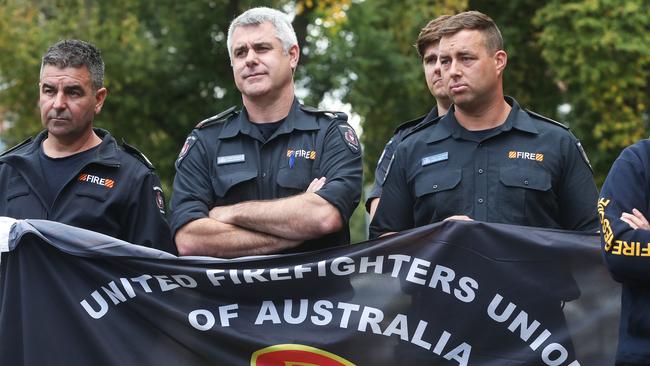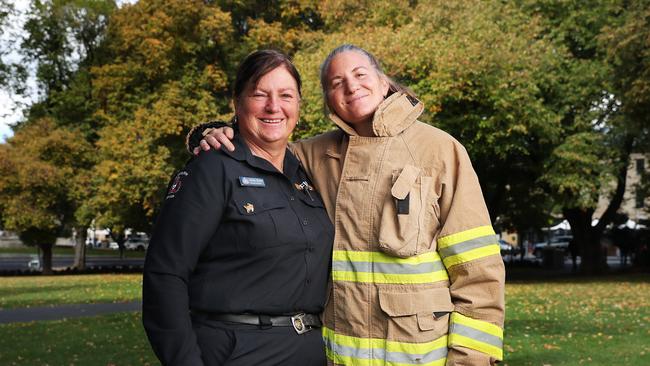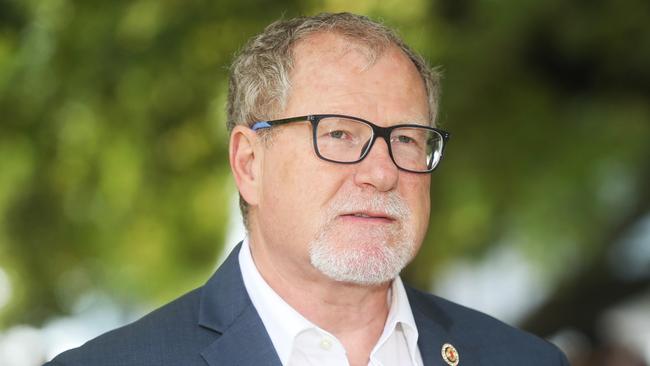Tasmania makes history as first in country to expand cancer protection for state’s fireys
Tasmanian firefighters celebrated a bittersweet victory after the island state became the first in Australia to expand cancer protection for its professional fireys. WHAT IT MEANS >

Tasmania
Don't miss out on the headlines from Tasmania. Followed categories will be added to My News.
Tasmanian firefighters celebrated a bittersweet victory after the island state became the first in Australia to expand cancer protection for its professional fireys.
Hours before a rally calling for the number of cancers covered under presumptive legislation to be expanded from 12 to 20, Minister for Workplace Safety and Consumer Affairs Elise Archer announced eight cancers would be added to the list.
The additional cancers included: primary site cervical cancer, primary site ovarian cancer, primary site penile cancer, primary site thyroid cancer, primary site pancreatic cancer, primary site lung cancer and malignant mesothelioma.
The move to include female cancers to the list was one that was particularly important to women firefighters, United Firefighters Union of Australia National Secretary Greg McConville said.
“When a firefighter succumbs to cancer, they want to concentrate on one thing and one thing only: their survival,” Mr McConville said.

“ … It is important they not be stressed by legal battles, and fighting with lawyers seeking to justify why and how they got cancer.”
He said that is why the presumptive legislation was so vital.
“Without presumptive legislation, it is impossible for a firefighter to prove that their cancer was caused by any particular incident, because in the course of their careers, they face thousands of incidents,” he said.
Mr McConville said despite advancements in firefighting procedure and protective clothing, firefighter cancer was getting worse – making it all the more important for female reproductive cancers to be listed, in line with male reproductive cancers.
“ … We will not stop until this is improved across every jurisdiction.”
Tasmania Fire Acting Station officer Shirley Berger shared her relief that female reproductive cancers had been listed.
“It’s been a little while coming, but at least its here,” Ms Berger said.

“I think you don’t want to be singled out by gender, but when you see legislation come out and its covering the males and not the females, you start thinking ‘hey, it’s about time we are included’.”
She said it was very obvious that female firefighters suffered from similar reproductive cancers that males did.
“It obviously has to be of some comfort to know that if you do get sick on the job and there’s a high chance as a firefighter that you will, that there will be support there for you.”
It was only in July 2022 that the World Health Organisation (WHO) officially declared firefighting a cancer-causing profession.
Currently, in all states and territories – except for Tasmania and the Commonwealth – only 12 types of cancer are covered under state law.

Trustee of the International Association of Firefighters, Alex Forrest, previously represented firefighters at the WHO’s International Agency for Research on Cancer meetings.
He travelled from Canada to address Australian politicians on the issue, and lauded the Tasmanian government’s historic move.
“This decision by Tasmania will go across the country; this is a big day for Australian firefighters, especially for female firefighters being able to be recognised for their part of the firefighting profession,” Mr Forrest said.
Ms Archer said the hazards of firefighting did not discriminate between the sexes.
She said Tasmania’s workers compensation laws would be changed as soon as possible to include the additional cancers.
More Coverage
Originally published as Tasmania makes history as first in country to expand cancer protection for state’s fireys




